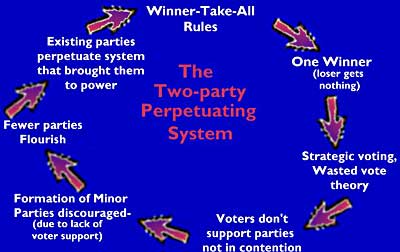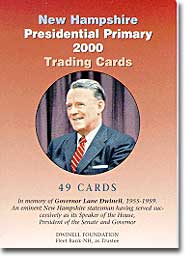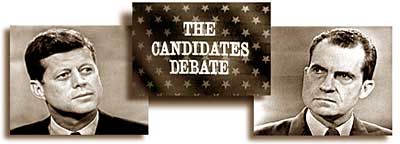5b. Campaigns and Elections
Collectively on all levels of government, Americans fill more than 500,000 different public offices.

The "winner-take-all" system of elections in the United States has many benefits, including a stable government administered almost exclusively by two parties. But one drawback is that third parties whose platforms differ from those of the Republicans and Democrats find it hard to compete.
Elections form the foundation of the modern democracy, and more elections are scheduled every year in the United States than in any other country in the world. Campaigns — where candidates launch efforts to convince voters to support them — precede most elections. In recent years campaigns have become longer and more expensive, sparking a demand for campaign finance reform. No one questions the need for campaigns and elections, but many people believe that the government needs to set new regulations on how candidates and parties go about the process of getting elected to public office.
Types of Elections
- Primaries.One reason that the process of campaigning is longer and more expensive is that primary elections now play such an important role in nominating candidates for office. Until the late 19th century, party activists generally selected candidates. Then primary elections were invented as part of a movement to democratize party nominations, and over the years, most states have adopted them. Direct primaries allow all party members to vote to choose the party's candidate for the general election. Most states conduct closed primaries, in which only registered party members may vote for their party's nomination. A few states allow voters to choose the party primary in which they want to vote on primary election day — a process known as open primaries. Primaries are usually held in the spring before the general election in the fall.
- General Elections.By law, candidates for Congress must be selected on the Tuesday after the first Monday in November in even-numbered years. The President and Vice-President have four-year terms, so they are only selected in every other general congressional election. State and local elections can be held at the same time and on the same ballot with national candidates, but sometimes they are elected in odd-numbered years or at other times of the year. For most elected positions, 50% of the vote is not required, but candidates need to win more votes than anyone else.

The New Hampshire presidential primary has been first in the nation since 1920. This is so important to the state's political identity that in 2000, it began issuing "Presidential Primary Trading Cards."

The primary function of the Federal Election Commission (FEC) is to administer and enforce the Federal Election Campaign Act (FECA) — the statute that governs the financing of federal elections.
Presidential Campaigns
Campaigns can be very simple or very complex. Running for the local school board is relatively simple. Candidates may just be required to file their names, answer a few questions from the local newspaper, and sit back and wait for the election. Running for President is altogether different. Today it is almost impossible to mount a campaign for the presidency in less than two years. How much money does it take? It certainly involves millions of dollars.

The Nixon-Kennedy debate in 1960 was the first televised debate between nominees from the major parties. This debate is still studied by scholars interested in the effect of the media on presidential politics.
Even the decision to run can be an expensive process. Potential candidates typically launch "exploratory committees" that involve extensive polling and fund-raising activities. Once potential candidates announce their candidacy, they must campaign for the primaries. Because primaries are conducted by states over several months in the spring before the election, candidates must crisscross the country, spending lots of time and money in the process. By tradition, the first primaries (Republican and Democratic) are held in New Hampshire in February, and the winners usually get a great deal of attention. As they mount their next campaigns, the winners often get more contributions than the losers, and so a phenomenon known as front-loading is created. The candidates who win the first few primaries almost always tend to win the later ones.
Party activists gather at the party conventions held in the summer to nominate their candidates formally. In the days before primaries, the party's selection was often uncertain going in to the convention. Today, however, the primaries make the decision. The candidates also announce their vice-presidential running mates at the summer conventions.
After the conventions, the race for the general election begins. Since most American voters identify themselves as moderates, candidates often shift their messages to "capture the middle." Presidential and vice-presidential debates, usually held in October, have become an important part of recent campaigns.
| As campaigns become more expensive across the country, candidates, government officials, and outside agencies have called for limits on where money can come from. The intent of these limits would be to return power to the electorate and take it out of the hands of special interest groups. Others believe that to limit campaign contributions in any way would take away the first amendment rights of individuals and groups to express their opinion on issues and candidates. |
The expense and length of modern American elections and campaigns has become one of the biggest issues in politics today. Some recommend that political party spending be more closely monitored, and others believe that overall spending caps must be set. Still others advocate national, not state, control of the primary process in order to reduce the length and expense of campaigns. Whatever the criticisms, American elections and campaigns represent a dynamic and vital link between citizen and government.







